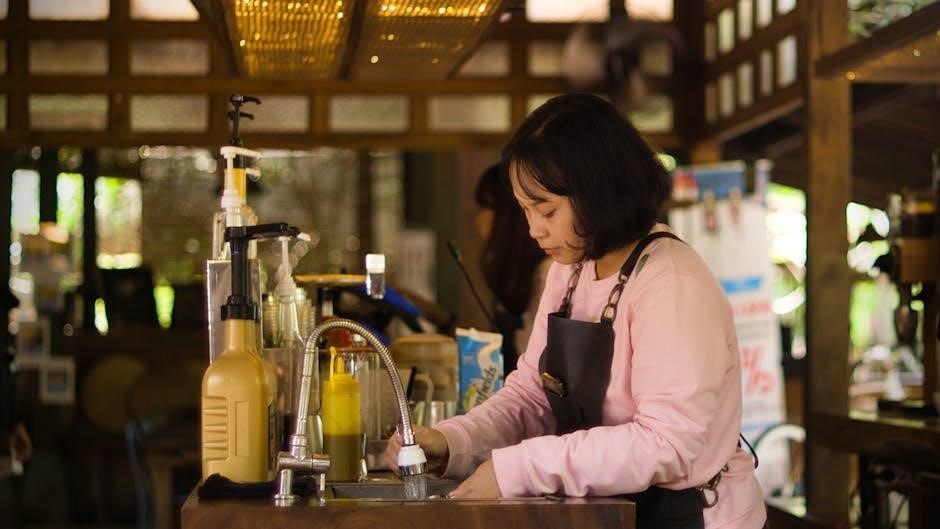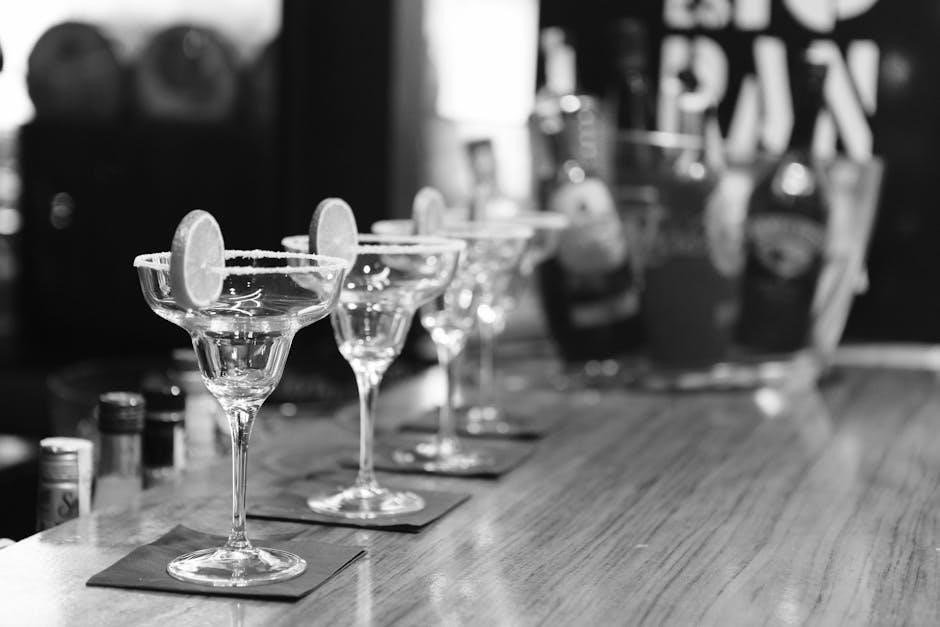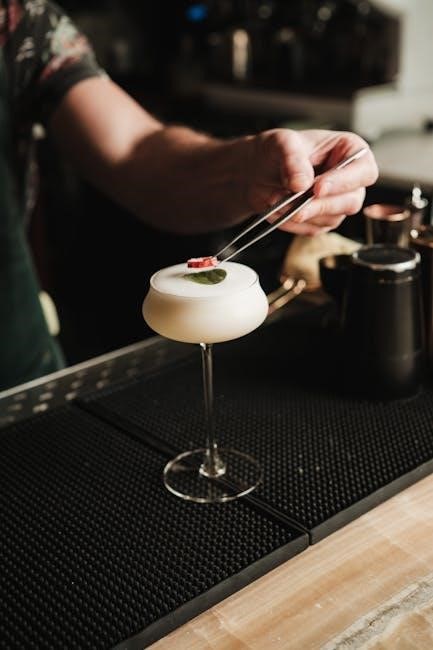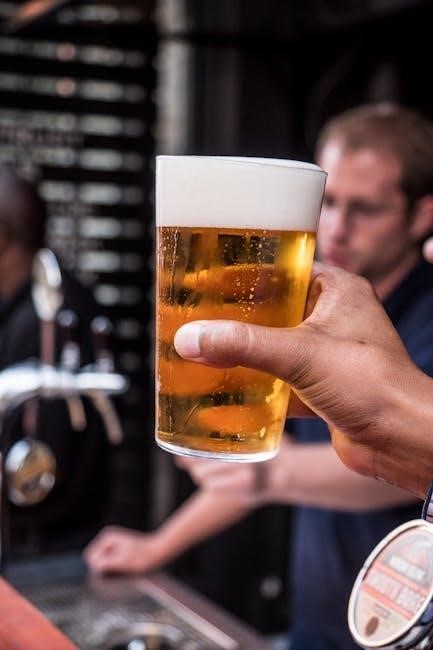Bartenders play a crucial role in the hospitality industry, serving beverages, managing bar operations, and ensuring customer satisfaction. Their duties require attention to detail, multitasking, and excellent interpersonal skills, making them essential for creating a welcoming atmosphere in restaurants, bars, and other establishments.
Overview of the Role and Importance in Hospitality
Bartenders are integral to the hospitality industry, ensuring exceptional customer experiences while managing bar operations. Their role extends beyond serving drinks, as they create a welcoming atmosphere, handle cash transactions, and maintain cleanliness. Bartenders must multitask efficiently, balancing drink preparation with inventory management and customer interaction. Their ability to adapt to fast-paced environments and provide personalized service enhances customer satisfaction and loyalty, making them vital to the success of restaurants, bars, and hotels. By combining technical skills with interpersonal abilities, bartenders contribute significantly to the overall guest experience, elevating the reputation of their establishments.

Core Duties of a Bartender
Bartenders are responsible for preparing and serving drinks, managing bar inventory, handling cash transactions, and maintaining a clean, organized workspace to ensure efficient service delivery.
Preparing and Serving Drinks
Preparing and serving drinks is a fundamental duty of bartenders, requiring attention to detail and knowledge of mixology. They mix, garnish, and serve beverages, ensuring quality presentation. Bartenders must know classic cocktail recipes, beer, and wine offerings, adapting to trends and customer preferences. They handle special requests, such as custom cocktails or non-alcoholic options, and manage drink pairings with food. Maintaining drink consistency and flavor is crucial, as is monitoring alcohol portions to prevent over-serving. Bartenders also ensure cleanliness of glasses and tools, contributing to a safe and enjoyable experience for patrons.
Managing the Bar Area and Inventory
Managing the bar area and inventory is a key responsibility for bartenders, ensuring efficiency and organization. They oversee stock levels of spirits, mixers, and garnishes, reordering supplies as needed. Bartenders also maintain the cleanliness and arrangement of the bar, ensuring all tools and equipment are in good condition. They implement inventory systems to track usage and minimize waste, often using checklists for opening and closing procedures. Additionally, they handle cash handling and security measures, such as securing alcohol and valuables. Effective inventory management ensures the bar operates smoothly, preventing shortages and maintaining profitability while providing excellent customer service. This role requires strong organizational and multitasking skills.

Customer Interaction and Service
Bartenders engage with customers, ensuring a positive experience by greeting them, taking orders, and making recommendations. They handle special requests, resolve issues, and maintain a welcoming atmosphere.
Providing Excellent Customer Service

Providing excellent customer service is a cornerstone of a bartender’s role. This involves greeting customers warmly, actively listening to their orders, and making personalized drink recommendations. Bartenders must also handle special requests, such as crafting custom cocktails or accommodating dietary restrictions, with patience and professionalism. Maintaining a clean and organized bar area ensures a positive experience, while engaging with customers through conversation and attention to detail fosters a welcoming atmosphere. Managing customer interactions with grace, even during busy or stressful times, is essential. By ensuring satisfaction and addressing feedback gracefully, bartenders build loyalty and contribute to the establishment’s reputation. Their ability to adapt and prioritize customer needs is vital.
Handling Special Requests and Custom Orders
Handling special requests and custom orders is a key aspect of a bartender’s role, requiring creativity and attention to detail. Bartenders must listen carefully to customers’ preferences and craft unique cocktails tailored to their tastes. This may involve experimenting with unusual ingredients or techniques to create one-of-a-kind drinks. Additionally, bartenders need to accommodate dietary restrictions, such as preparing non-alcoholic or low-sugar options. Effectively managing these requests while maintaining efficiency, especially during peak hours, is essential. By fulfilling special orders with precision and flair, bartenders enhance the customer experience, fostering loyalty and setting the establishment apart from others in the competitive hospitality industry.

Financial and Operational Responsibilities
Bartenders handle financial tasks such as processing payments and managing cash accurately. They also maintain inventory, ensure cleanliness, and comply with legal requirements, including age verification.
Processing Payments and Handling Cash
Processing payments and handling cash are critical tasks for bartenders, ensuring accurate transactions and maintaining financial integrity. They operate point-of-sale systems, manage cash registers, and handle card payments efficiently. Bartenders must ensure all transactions are secure, reducing errors or discrepancies. They are also responsible for counting their till at the start and end of shifts, reconciling receipts, and handling float management. Additionally, they handle customer change, process refunds, and address any payment issues promptly. Effective cash handling skills are essential to maintain trust and smooth bar operations, contributing to overall customer satisfaction and business success.
Maintaining Cleanliness and Hygiene Standards
Maintaining cleanliness and hygiene is a cornerstone of a bartender’s role, ensuring a safe and pleasant environment for customers. This includes sanitizing equipment, washing glassware, and wipedown surfaces regularly. Bartenders must adhere to health and safety regulations, ensuring all tools and areas are spotless. They also restock supplies, such as napkins and garnishes, and dispose of waste properly. Cleanliness extends to personal hygiene, as bartenders handle food and drinks. By upholding these standards, bartenders contribute to customer satisfaction and the overall reputation of the establishment. Attention to detail in cleanliness is vital for preventing contamination and providing a hygienic experience for patrons.

Advanced Bartender Responsibilities
Bartenders must manage challenging situations, such as handling intoxicated patrons and resolving conflicts, while maintaining professionalism. They also collaborate effectively with teams in high-pressure environments, ensuring seamless service.
Managing Difficult or Intoxicated Customers
Bartenders must handle difficult or intoxicated patrons with tact and professionalism. This includes monitoring alcohol consumption, refusing service when necessary, and ensuring a safe environment for all customers. Effective communication and conflict resolution skills are essential to de-escalate tense situations. Bartenders must also adhere to legal regulations, such as age verification and drink limits, to prevent liability issues. Proper training in recognizing signs of intoxication and managing challenging behaviors is crucial for maintaining order and providing a positive experience for patrons.
Working as Part of a Team in a Fast-Paced Environment
Bartenders often work in dynamic, high-pressure settings, requiring strong teamwork and coordination. They must collaborate with colleagues, such as servers and kitchen staff, to ensure seamless service delivery. Effective communication is key to managing orders and maintaining workflow during peak hours. Bartenders also need to adapt quickly to changing situations, such as unexpected shortages or equipment malfunctions, while maintaining composure. Teamwork ensures a smooth operation, enhancing both customer satisfaction and overall efficiency in the fast-paced environment of a bar or restaurant.

Legal and Safety Compliance
Adhering to age verification laws, refusing service to intoxicated patrons, and maintaining a safe environment are critical responsibilities. Bartenders must ensure legal and ethical alcohol service standards.
Adhering to Age Verification and Alcohol Service Laws
Bartenders must strictly enforce age verification by checking identification to ensure no underage alcohol service. They are legally required to refuse service to intoxicated patrons, maintaining ethical standards. Knowledge of local alcohol laws, such as drinking age limits and service restrictions, is essential. Failure to comply can result in legal consequences for both the bartender and the establishment. This responsibility ensures a safe environment and protects both customers and the business from potential risks.
- Verify customer age before serving alcohol.
- Refuse service to intoxicated individuals.
- Stay updated on local alcohol service regulations.
Self-Care and Stress Management in Bartending
Self-care and stress management are essential for bartenders due to long hours and high-pressure environments. Staying physically fit, practicing stress-reduction techniques, and maintaining a work-life balance are crucial. Prioritizing mental health ensures resilience and peak performance behind the bar.
Managing Long Shifts and Physical Demands

Bartenders often work long hours on their feet, which can be physically demanding. Staying hydrated, taking short breaks, and stretching can help reduce fatigue. Wearing supportive footwear and maintaining proper posture are also crucial. Additionally, managing the physical demands of lifting heavy objects, such as beer kegs or crates, requires strength and care to prevent injuries. Time management is key to balancing tasks efficiently during busy shifts. Ensuring adequate rest and recovery after work helps maintain energy levels and overall well-being. By prioritizing physical health, bartenders can perform at their best and maintain longevity in their careers.

Career Growth and Development
Bartenders can advance by mastering mixology, moving into management roles, or becoming trainers. Continuous learning and adapting to trends enhance career opportunities and professional growth in hospitality.
Continuous Learning and Adaptation in Mixology
Bartenders must stay updated on mixology trends, techniques, and ingredients to remain competitive. Attending workshops, experimenting with new recipes, and learning about diverse spirits and flavors are essential. Adaptation to customer preferences and dietary restrictions, such as crafting non-alcoholic cocktails, keeps bartenders relevant. Continuous learning ensures they can innovate and deliver exceptional drinks, enhancing both their skills and the establishment’s reputation. This commitment to growth not only advances their careers but also enriches the overall customer experience.




